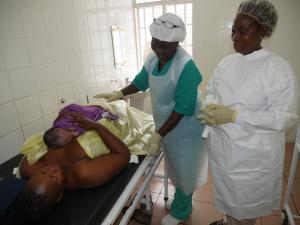Building the skills of health workers to save women's lives
Tackling maternal mortality is among the most critical priorities for Sierra Leone. Today, much is being done to improve the quality of healthcare before, during and after women give birth.
Taking data from 2015, it is estimated that every day, the equivalent of eight women lose their lives during pregnancy and childbirth. This is an immense tragedy for families, for communities, and for the nation as a whole.
To help address this issue, the Government of Sierra Leone has set an ambitious national target to save the lives of 600 women and 5000 children by 2018 through the post-Ebola Presidential Recovery Priorities, with a specific focus on enhancing the quality of health services they receive.
As in other countries, most maternal deaths tragically occur because of complications that are preventable or treatable. According to recent data, bleeding and eclampsia cause the majority of these fatalities in Sierra Leone; post-partum haemorrhages alone account for a third. This is the reason why quality emergency care is so critical for saving women's lives.
To such effect, UN and other partners are working with the Ministry of Health and Sanitation to improve the skills of key personnel in delivering effective Emergency Obstetric and Newborn Care (EmONC). In the first instance, a practical EmONC training programme has been rolled out at the Princess Christian Maternity Hospital (PCMH) in Freetown, Sierra Leone’s largest maternity hospital. Following promising results, it will subsequently be expanded to hospitals in all of Sierra Leone's 14 districts.
Under the programme, 50 health workers from PCMH have been trained to date including doctors, midwives, nurses and Community Health Officers, using practical, hands-on training that introduces them to essential clinical skills. By doing the trainings within the facilities, the programme has also supported staff to rethink their environment to optimise and accelerate emergency care, from increasing the accessibility of emergency medicines and supplies, to streamlining triage and treatments.
Dr David Jalloh who participated in the training says that he has observed noticeable improvements in staff confidence since the programme came into effect, with staff feeling more empowered to make assessments and appropriate decisions - particularly during triage. This is helping to accelerate treatment time for patients in need and reduce over-reliance on the hospital's limited number of doctors.
“I am personally confident that we now have the capacity to save more lives in PCMH. From the moment a patient steps into the facility – from triage through to the different tiers of treatment - everyone knows what to do and they do it immediately.”
The EmONC programme is one of several that aim to improve health services for women and children in Sierra Leone, whether targeting facility improvements such as blood availability, improving takeup of antenatal services, enhancing access to lifesaving medicines, or facilitating training and mentorship of health workers.
“Knowing and learning more improved ways of saving lives and putting such training into practice gives me satisfaction beyond words,” added Dr. Jalloh. “I am hopeful that when the EmONC training will be rolled out across the country, we will see a marked reduction in maternal and child mortality.”
Through such interventions, WHO and partners together with the Ministry are working to ensure that childbirth is a time of joy, not loss for Sierra Leoneans – on International Women’s Day and every day to come.
EmONC activities are being supported by the UN agencies including UNFPA and WHO with support from the UK Government, the London School of Hygiene and Tropical Medicine, and other NGOs and partners.
